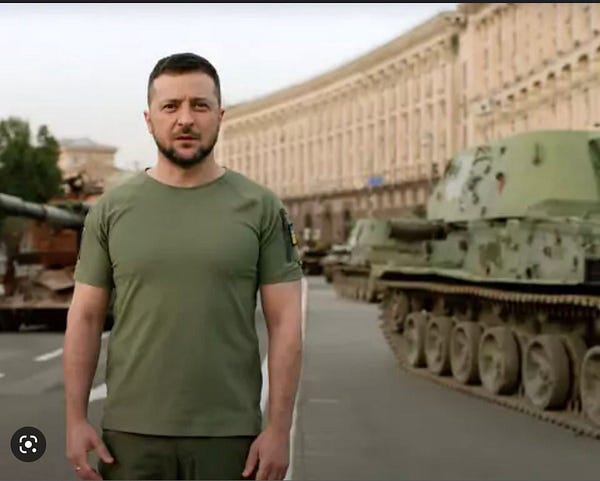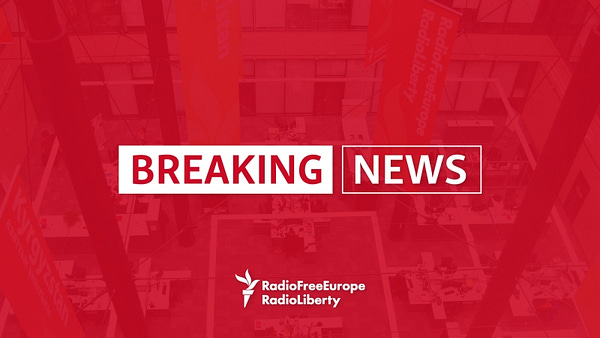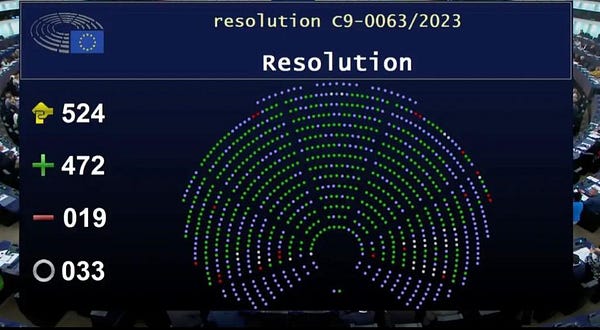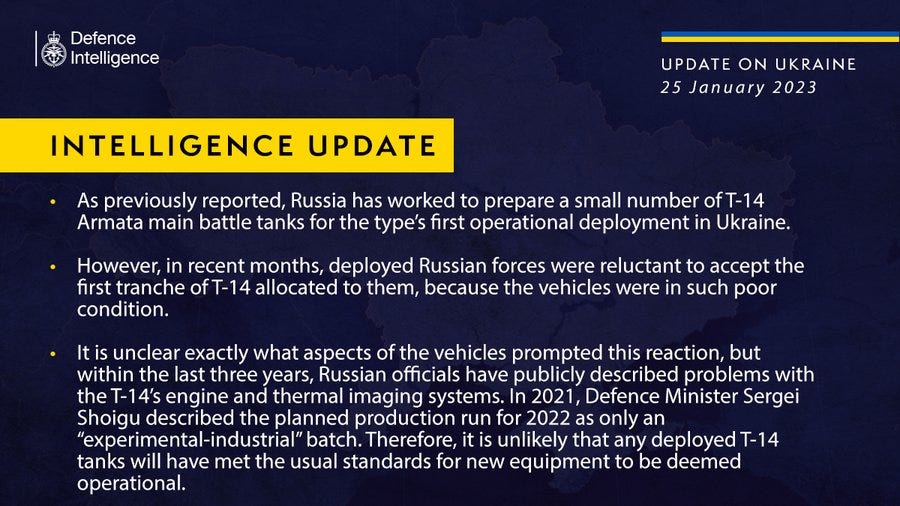Jan 25: Buonasera Mag
Day 336: UASituation Soledar Azovstal NATO UAreserves Blinken RUOrtho UAreshuffle tanks Switzerland letterbombs-A&Ps-AFP UKDef Alander Byrne Geman Kubilius Sonnenfeld Lungescu Babij Nichols Legum
Catching up
Hop over the Scott Lucas’s EA Worldview for the latest up-dates from the US and the Middle East as well as Europe.

Stories we’re following…
Russian attacks across 8 Ukrainian oblasts kill 5, injure 6 on Jan. 23. Russian attacks were reported in Donetsk, Kherson, Kharkiv, Sumy, Mykolaiv, Chernihiv, Zaporizhzhia, and Luhansk oblasts in the east, south, and north of Ukraine.
The Ukrainian military has conceded that its troops have pulled out of the battle-scarred town of Soledar in the eastern Donetsk region, which Russian forces said they captured earlier this month.
Russia does not plan to rebuild the Azovstal steelworks in Mariupol which were the site of heavy bombardment in the early weeks of Russia’s invasion of Ukraine last year. According to the Russian Tass news agency, construction ministry official Yulia Maximova said it would be “impossible and unprofitable”.
Ukraine has enough coal and gas reserves for the remaining months of winter despite repeated Russian attacks on its energy system, prime minister Denys Shmyhal has said.
Secretary Anthony Blinken spoke with G7 and EU partners to reinforce the collective support for Ukraine’s energy sector, including Ukraine's long-term vision to modernize and decarbonize its energy grid and integrate with the European system.
Ukraine imposes sanctions on 21 Russian Orthodox Church clerics. President Volodymyr Zelensky signed a decree on Jan. 23, approving a proposal by the National Security and Defense Council to sanction 21 leaders and priests of the Russian Orthodox Church.
Oleksiy Kuleba was moved yesterday from being governor of Kyiv region to take up a new role in President Zelensky’s office.
The upheaval in Ukraine’s authorities continues today, with state broadcaster Suspilne reporting that prosecutor general Andriy Kostin has “signed orders on the voluntary dismissal of the heads of the Zaporizhzhia, Kirovohrad, Poltava, Sumy, and Chernihiv regional prosecutor’s offices.”
The recent corruption scandals that led to the biggest government reshuffle since the beginning of Russia's full-scale invasion in February 2022 do not appear to have involved the military and humanitarian assistance supplied to Ukraine by the United States, State Department spokesperson Ned Price said on Jan. 24.
German exports to Russia nearly halved last year to levels not seen since 2003, according to data seen by Reuters on Tuesday, as sanctions targeting Moscow for the war in Ukraine took their toll on once-close ties. German exports to Russia slumped by 45% year-on-year to €14.6bn ($15.9bn) in 2022, according to preliminary data from the German Committee on eastern European Economic Relations.
Reuters has produced a quick guide to which countries are poised to send tanks to Ukraine, with an announcement from the US and Germany expected later today.
US: officials say Washington is poised to send 31 of its M1 Abrams battle tank, reversing its previous position. President Biden is scheduled to deliver remarks on Ukraine at 12pm ET (GMT 1700), the White House has said.
Germany: sources say chancellor Olaf Scholz has decided to send 14 Leopard 2 battle tanks, munitions and logistics. He will also allow other countries to send theirs, they say. Training will begin in Germany soon.
UK: the British government announced on 14 January that it would send a squadron, or 14, of its Challenger 2 battle tanks.
Poland: Warsaw has said it is ready to send up to 14 of its Leopard 2 tanks and has been pressing Berlin to approve the move.
Norway: the government is considering whether to send some of its Leopard tanks, newspapers reported.
Finland: has said it could donate a small number of Leopard 2 tanks to Ukraine if a wider group of European nations also decided to do so, but it would depend on Berlin’s approval.


Pentagon to increase artillery production by 500% for Ukraine. The United States Army's top acquisition official told the New York Times that U.S. production of 155-millimeter shells would increase to 90,000 a month within two years.
Portugal is preparing to send 4 Leopard 2A6 to Ukraine, reports Correio da Manhã referring to sources linked to the Portuguese Ministry of Defense. In total Portugal has 37 Leopard 2A6s.
In Spain, El País is reporting that the government is poised to commit to sending tanks to Ukraine. It writes: “Spain will join the delivery of Leopard tanks to Kyiv once Germany, after months of resisting delivering it, has agreed to supply the powerful German-made battle tank to the Ukrainian Army. The Spanish Government had conditioned its participation in the operation to provide Ukraine with a system capable of counteracting the firepower of modern Russian tanks on the existence of an agreement at the European level.”
Poland will ask the EU for compensation for the cost of Leopard 2 tanks it wants to send Ukraine, the Polish prime minister said on Tuesday. “We will apply for reimbursement to the European Union, it will be another test of goodwill,” Mateusz Morawiecki told a news conference.
Switzerland may allow re-export of its weapons to Ukraine. On Jan. 24, the Swiss parliament’s lower house security policy commission approved an initiative to allow other countries to re-export weapons made in Switzerland to Ukraine.
Dmitry Muratov and Maria Ressa appealed to the International Committee of the Red Cross in an open letter to act on its mission to “prevent and alleviate human suffering. As long as the torment [of Navalny] continues, we’re all accomplices of the executioners,” they wrote in an open letter published on the website of Muratov’s Novaya Gazeta newspaper.

The United Nations cultural agency UNESCO said on Wednesday that it had designated the historic centre of Odesa on Ukraine’s Black Sea coast, a World Heritage in Danger site.
Russia met with officials at Uefa on Tuesday as it tried to make its return to international football in Europe. When the UEFA and FIFA bans imposed on 28 February were challenged at the Court of Arbitration for Sport, judges agreed that the consequences of letting Russian teams play “would be irreparable and chaotic” for the smooth running of competitions.
Spanish police have arrested a 74-year-old man suspected of being the author of the letter-bombs sent in late 2022 to several institutions and embassies in Spain, TV station La Sexta reported on Wednesday. The devices were sent to targets including Prime Minister Pedro Sanchez, the Ukrainian Embassy in Madrid, government offices, a European Union satellite company and the US Embassy between Nov. 24 and Dec. 2.
Federal prosecutors in Germany said Monday that they have indicted five people for treason and forming a "terrorist organization" that aimed to topple the government and spark a civil war. Prosecutors said the suspects, four men and one woman, had made "concrete preparations" to cause a large-scale blackout in the country and use the ensuing chaos to establish an alternative government. They also allegedly planned to kidnap the country’s health minister, Karl Lauterbach, who has faced extreme vitriol from opponents of the government's pandemic restrictions.
China can spy on anyone in the UK through smart fridges, light bulbs and other appliances controlled through an app, a report warned yesterday. Microchips embedded in cars and domestic appliances pose a ‘wide-ranging’ threat to national security because China could ‘weaponise’ them to spy on millions of Britons. The modules are also found in laptops, voice-controlled speakers, smart watches, smart energy meters, doorbell cameras, police body cams, cashpoints, cars and even hot tubs. They collect data and can be handed to the Chinese government if ordered to.
The Bulletin of the Atomic Scientists has set its Doomsday Clock, intended to illustrate existential risks to the world, at 90 seconds to midnight, the closest to midnight the clock has ever been since it was first introduced in 1947.


The Kyiv Independent, Ukraine: cleaning up house
Governors, government officials lose jobs in biggest reshuffle since start of full-scale war. The government has officially dismissed six top officials and greenlighted the firing of five governors in the most significant reshuffle since the start of the full-scale war.
The Jan. 24 reshuffle came after a series of corruption investigations alleged misappropriation of funds among several top officials.
According to Taras Melnychuk, official government representative in parliament, those fired are Deputy Defense Minister, Deputy Social Policy Minister, two Deputy Territories and Communities Ministers, and two Deputy Heads of State Service of Maritime and River Transport.
Additionally, the government approved the ousting of five governors – Dnipropetrovsk Oblast Governor Reznichenko, Zaporizhzhia Oblast Governor Starukh, Sumy Oblast Governor Zhyvytsky, Kherson Oblast Governor Yanushevych, and Kyiv Oblast Governor Kuleba.


Ben Geman, Ukraine war upended energy markets forever- Axios
Nearly a year after Russia's invasion, the Ukraine crisis has permanently reshaped the global energy system and brought severe economic pain.
Why it matters: The worst-case scenarios haven't come to pass, thanks to a mix of EU policies, Russian President Vladimir Putin's miscalculations and pure luck. But the impact is apparent on every facet of the market, from natural gas to oil to low-carbon energy.
How it works: European gas prices soared to record levels, but have since fallen back to below pre-war levels. That's partly thanks to more supplies from the U.S. and elsewhere, but it's also because of planning.
European nations have made moves to sever ties with Russian coal, oil and gas and diversify their supplies, conserve energy and fill gas storage facilities.
That effort has also prompted EU officials to accelerate and scale up efforts to deploy low-carbon tech like renewables and heat pumps. (There was also some short-term switching to carbon-intensive coal, thanks to the gas price increases and supply crunch.)
Luck was also a factor, with unusually mild weather that has cut heating demand.
"Widespread shortages, which were once legitimately feared, have not materialized," writes Financial Times energy editor David Sheppard in a column titled "Vladimir Putin is losing the energy war."


Jeffrey Sonnenfeld, The World Economy No Longer Needs Russia- Foreign Policy
For much of the past year, and since his invasion of Ukraine last February, Russian President Vladimir Putin has been riding high on his supposed energy omnipotence, holding the global economy hostage to his whims. Since last summer, Putin has choked off natural gas supplies to Europe, hoping that Europeans, shivering and without heat during the winter, would turn on their leaders and make it politically infeasible to continue support for Ukraine.
The threat was potent: In 2021, a whopping 83 percent of Russian gas was exported to Europe. Russia’s total global exports of 7 million barrels of oil a day and 200 billion cubic meters (bcm) of piped gas a year accounted for about half of its federal revenue. Even more importantly, Russia’s commodities exports played a crucial role in global supply chains: Europe was reliant on Russia for 46 percent of its total gas supply, with comparable levels of dependence on other Russian products including metals and fertilizer.

Larissa Babij, a Kind of Refugee- 22.01.23
2015. Summer. Over a year since russia invaded Ukraine, sending “little green men” into Crimea and then annexing the peninsula after a sham referendum. Most of the activists who had camped out for months on Maidan in the center of Ukraine’s capital are now in the east — an improvised army equipped by volunteers — defending the country from russia’s proxy separatist movements.
Walking around Kyiv that summer, I occasionally come upon people lying on the ground, drunk. Rather than step over the body of a man who is lying across my path — it feels disrespectful — I bend down and ask him something. Another pedestrian comes up and together we assist the drunk man to a grassy patch closer to the road. Returning to my path I watch with horror from the corner of my eye as he stumbles into the street, cars swerving to avoid him.
Tom Nichols, To Defend Civilization, Defeat Russia- The Atlantic
Ukraine needs any weapon its troops can learn to use, including tanks, to hold the line on the international order and the world’s safety.
I don’t often find myself agreeing with Senator Lindsey Graham, the South Carolina conservative who long ago rebranded himself as Donald Trump’s faithful valet and No. 1 fan. Last week, however, Graham lashed out in frustration at the dithering in Europe and America over sending more weapons to Ukraine. “I am tired of the shit show surrounding who is going to send tanks and when they’re gonna send them,” he said during a press conference in Kyiv, flanked by Democratic Senators Richard Blumenthal of Connecticut and Sheldon Whitehouse of Rhode Island. “World order is at stake. [Vladimir] Putin is trying to rewrite the map of Europe by force of arms.”
Graham is right. Germany, for example, has been reluctant to send Leopard tanks to Ukraine; the Germans, for their part, would likely prefer to see the United States send American tanks first. But everyone in the West should be sending anything the Ukrainians can learn to use, because a lot more than mere order is at stake, and order, by itself, is not enough. As Rousseau wrote, “Tranquility is found also in dungeons,” but that does not make dungeons desirable places to live. Global civilization itself is on the line: the world built after the defeat of the Axis, in which, for all of our faults as nations and peoples, we strive to live in peace and cooperation—and, at the least, to not butcher one another. If Russia’s campaign of terror and other likely war crimes erases Ukraine, it will be a defeat of the first order for every institution of international life, be it the United Nations or the international postal union.












